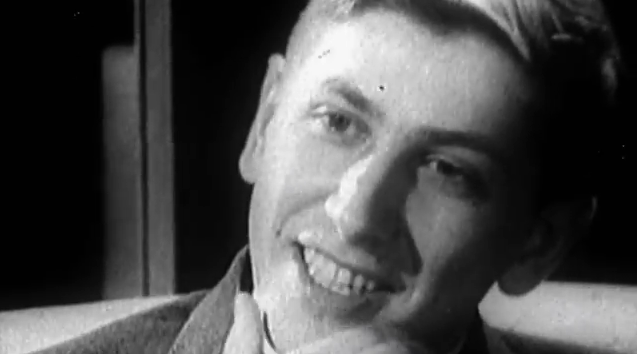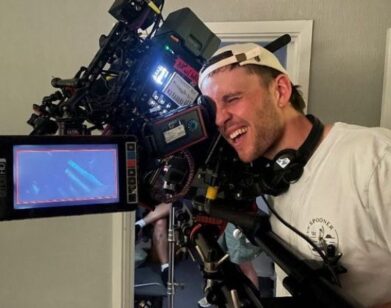Chess Story: Liz Garbus on Bobby Fischer

In a photograph taken by Harry Benson for Life magazine, Bobby Fischer torturously considers his next move—hands gripping his head and eyes fastened to the board—as his 1972 World Chess Championship opponent, Boris Spassky, looks on. Twenty-one games later, Fischer won what had been dubbed “The Match of the Century.” The Soviet Union’s 24-year domination of the game was over.
Fischer, who looked like a senator—tall, handsome, broad-shouldered, competitive, and charismatic—was an American hero whose genius ultimately led to his own demise. In some of Benson’s pictures, Fischer’s obsessive, eccentric, and ultimately paranoid side is foreshadowed: Bobby looks pale and grave, with haunted, Buster Keaton eyes.
In Emmy-winning director Liz Garbus’ documentary Bobby Fischer Against the World, which airs tonight on HBO, the prodigy-turned-recluse’s life is chronicled, not just as biography but as an analogy (to a degree) of the Cold War. Interviews with Fischer’s mentors and chess masters, with Dick Cavett and Henry Kissinger, and with Bobby’s bodyguard, Saemi Palsson, who describes Fischer as both gentle and a volcano—”It was better to know when to speak and when to be quiet”—and shepherded by Garbus’ keen storytelling instincts, document and consider the complexities of who Bobby Fischer was and what he later became.
DURGA CHEW-BOSE: What initially sparked your interest in Bobby Fischer’s story?
LIZ GARBUS: On January 18, 2008, I was on an airplane going to the Sundance Film Festival for another project and read Bobby Fischer’s obituary. I think, like many people, I knew a little bit about Bobby Fischer, but I didn’t know the full story. I got off the plane, and I just wanted to read more and know more, and that was kind of it: “Okay, this has to be my next film.” It made me obsessed—his story just has so many rich elements. The whole concept of what it means to be a genius in our society and the way that’s changed over time, and of celebrity and the pressures of celebrity on individuals, and who can withstand them and who can’t. And also, just the match of ’72 is such a thriller. It’s such a great narrative full of dramatic moments. The challenge was getting the material together to tell the story, because a lot of it was really hard to find—it became like an excavation project.
CHEW-BOSE: What do you think our fascination as a society is with geniuses?
GARBUS: I think the whole modern concept of genius has become sort of a mantle and burden to bear. The Greeks regarded genius as a sort of spirit that would come from afar and inhabit you, and so you weren’t always a genius, the fairy or spirit might leave you and you might become a dunce. So it wasn’t actually you, it wasn’t actually the individual. Of course our modern conception of genius is just that, it is the individual and that this person possesses incredible intellectual powers. I think the combination of genius and celebrity, in the case of Bobby Fischer, was a dangerous cocktail. When your entire life is focused around one goal and one goal only, and you have no other pursuits, it enables you to achieve enormous mastery, as he did in the game, but it also made him very ill-suited for life outside of it.
CHEW-BOSE: What do you think happened to him?
GARBUS: You know, Johnny Carson, after Bobby won the match, asked him, “So, Bobby, how does it feel now to be the World Chess Champion? It must be kind of a letdown?” Which is an interesting question for Carson to ask him. And then Bobby says, “Yeah, you know, I kind of feel like something’s been taken from me.” And what is he talking about there? His raison d’être has been taken from him because he’d achieved his life goal. I think that after that, there was just nowhere for him to go. Of course many people can withstand that, but Bobby obviously had too fragile psychology to continue to live under that kind of pressure.
CHEW-BOSE: Do you think more people should have intervened or suggested he speak to someone or go to therapy—someone that wasn’t a chess master or in his chess world?
GARBUS: Yeah, I think that’s true, it’s a good observation that you made that so many of the people we interviewed and the people in Bobby Fischer’s life were involved for reasons that were larger than Bobby himself. They attached themselves to his rising star—they were totally impressed by his chess play and wanted to be around it. They wanted to get a job, they wanted to get the best picture, so that of course played into Bobby’s own suspicions and distrust of people, because he didn’t know why he was with them. And it also plays into how far people would go to intervene, because if they’re not invested in him as a friend or someone who is healthy, they’re invested in him as a machine. I think that definitely affected him. There were people who tried, though—for instance, Anthony Saidy definitely told Bobby he needed help, but Bobby didn’t want to hear that. His mother took him to a psychiatrist when he was little and that was the end of it.
CHEW-BOSE: Right, when the psychiatrist said that there are worse things than having a child obsessed with chess…
GARBUS: Right, yeah. Exactly. You know, what would have happened if Bobby had been medicated? And who would that have been good for? Bobby Fischer was hugely important for the American chess community because it put chess on the map—he made it possible for other chess players to make a living.
CHEW-BOSE: And that game was such a great analogy for the Cold War: a dueling match of the minds during the Cold War.
GARBUS: Right, I don’t think there could have been another Bobby Fischer. The cultural conditions of the time are what produced that. There’s no cultural parallel to now; there was the Cold War, it was the Soviets’ domination of the sport, it was the Soviets making this their national sport, and then it was this young kid growing up in Brooklyn and the myth of the individual-the American individual and the myth of self-creation. Here he was, and he could beat the Russians. It was just so much of the time, and chess, of course, the game itself, is a war game.
CHEW-BOSE: Despite Bobby’s eventual paranoia and complete withdrawal from the world, in the film’s interviews, his friends and admirers still speak very lovingly about him. Like Dick Cavett or any of the chess masters. Do you consider what happened to him as a tragedy, an inevitability?
GARBUS: I see it as a tragedy, and I also empathize with him. The way to kind of understand Bobby in the ’90s, and the 2000s up until he died, was to listen to his radio call-in shows. So we called those and got about 200 hours from all over the world. I thought, “If Bobby’s talking for 200 hours, he’s going to say something, he’s going to reveal something.” But what was striking was how just totally redundant they were in his kind of spewing of anti-American, anti-Semitic ideology—he just was a needle on a scratch and could not get off of it. It was so clearly the ravages of mental illness. It was not somebody was organized in his ideological thinking and wanted to create some violent movement against the United States or against Jews, it was just a mind that was overrun by these thoughts. So I feel empathetic because he was ill, he was suffering. It was a tragedy. It was a tragedy for the chess world, the man who could have used his celebrity to continue to keep chess cool. And of course a tragedy for people who cared about him.
CHEW-BOSE: He was also very handsome, in a way that makes his story all the more classic, and the degree to which he derailed is such a glaring consequence of how celebrity is treated in the United States, and how it ruins great minds or performers, or artists—especially those who were “discovered” as children. Do you think that’s symptomatic of American culture, or if he was from another country, the same might have been true?
GARBUS: There’s no way of knowing. In the Soviet Union, for instance, the pressure on the chess stars was immense. When Boris Spassky came home after losing that match, he found he no longer had an apartment in Moscow. The Communist Party took his apartment away. There was some serious payback on his end. Our culture of celebrity, this idea of losing yourself in this larger idea of this person, was being projected onto Bobby. And, yeah, he’s good-looking, he laughs, he has a sense of humor—he inhabited that rock-star role, somewhat reluctantly, but at some points he seemed to enjoy himself. I think that now we really see what this relentless pressure can do, especially when someone doesn’t have the protective factors of a stable family unit or…
CHEW-BOSE: Or a childhood.
GARBUS: Yeah, or any kind of other interests or solid relationships. Also if you already have a proclivity to obsessive behaviour or monomania, which Bobby certainly had with chess, it can be very hard. But I do believe it is an American story. I do think our obsession with the other and the way we build people up to inhabit all of our dreams, and here was Bobby, this lone Cold Warrior, representing all of us.
CHEW-BOSE: One part that really fascinated me was when Bobby started working out and equating physical fitness with yet another way he could be superior and perfect. He said that joke about when he plays Spassky and shakes his hand, he’ll want him to feel his strength. But was there something else going on there?
GARBUS: I think what made Bobby so great was not just his creativity on the chest board, and was not just how hard he studied and that he had memorized more patterns of games and ways to win than anybody else, but also his killer instinct and desire to dominate and crush others. He had this desire to win and to beat someone that was palpable. When he was saying he wanted to shake Spassky’s hand and hurt him, he’s not joking. He wanted to intimidate and crush his opponents. He would challenge himself as an athlete, like how long could he hold his breath underwater, and each time he wanted to hold it a little bit longer, a little bit longer, a little bit longer. He wanted to feel powerful and invincible. People said when they played Bobby, it was like a wall advancing against them. He would just rob you of your tools, until you felt emasculated—like a boxing match. Until you felt like a small child and you wanted to beg for help and go home crying, I mean that’s how people felt when they sat down with him. You know, Dick Cavett, in an interview, said to Bobby, “For you, Bobby, what’s your greatest pleasure?” And he answered, “When you crush another man’s ego.” Bobby said that totally seriously.
CHEW-BOSE: Where do you think that came from?
GARBUS: [laughs] That sadism?
CHEW-BOSE: Do you think it’s from not really having a childhood? Or do you think it’s from perpetually being a child?
GARBUS: That’s interesting. It’s like how kids feel when they play—they can’t lose. Maybe that’s where Bobby’s development ended. I do think that if there is a message with the film, Bobby says it himself at the end of the movie when the interviewer says to him, “Do you think you should have maybe done some other stuff?” and Bobby says, “Yeah, maybe it would have been better to be a little more well-rounded.” [laughs]
CHEW-BOSE: Does his story haunt you?
GARBUS: It does haunt me. There’s so much that could have been done. And also, we know that Bobby would not have wanted a documentary made after his life. And he started filming for a documentary in Iceland, and he got angry, and lost trust in people really quickly. He cut them out. But Bobby Fischer’s story was an American story, and I think he’s a part of our history, and the story had to be told. But certainly, I’m sure he would not have given it his blessing. But I also feel like his story is larger than just him. It was about the Cold War, and it was about American history.
BOBBY FISCHER AGAINST THE WORLD PREMIERES TONIGHT AT 9 PM ON HBO. FOR MORE INFORMATION, CLICK HERE.






